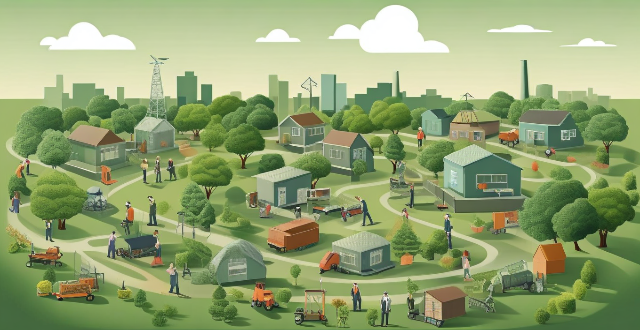Green employment, or green-collar jobs, are essential in achieving sustainability by promoting environmentally friendly practices, enhancing social well-being, and fostering economic growth through innovation and job creation. These jobs focus on renewable energy, waste reduction, sustainable agriculture, ecotourism, and more. By embracing these sustainability careers, we can build a resilient future for all.

How Does Green Employment Contribute to Sustainability?
Green employment, also known as green-collar jobs or sustainability careers, refers to work in industries and occupations that promote environmental sustainability. These jobs focus on reducing the negative impact of human activities on the environment, conserving natural resources, and promoting eco-friendly practices. Green employment plays a crucial role in achieving sustainability by addressing various aspects of environmental, social, and economic sustainability. Here's how:
Environmental Sustainability
Promoting Renewable Energy Sources
- Wind Turbine Technicians: Installation, maintenance, and repair of wind turbines.
- Solar Photovoltaic Installers: Installation and maintenance of solar panels.
- Hydropower Plant Operators: Operation and maintenance of hydroelectric power plants.
Reducing Waste and Pollution
- Recycling Coordinators: Overseeing recycling programs and promoting waste reduction strategies.
- Environmental Health and Safety Specialists: Implementing policies to reduce workplace pollution and hazardous waste.
- Sustainable Packaging Designers: Creating eco-friendly packaging solutions to minimize waste.
Social Sustainability
Enhancing Quality of Life
- Green Building Designers: Designing energy-efficient buildings that improve indoor air quality and reduce resource consumption.
- Urban Farmers: Cultivating crops in urban areas to provide fresh produce and promote healthy eating habits.
- Community Garden Coordinators: Engaging local communities in sustainable gardening practices.
Providing Education and Awareness
- Environmental Educators: Raising awareness about environmental issues through workshops, classes, and public speaking engagements.
- Sustainability Consultants: Advising businesses and organizations on implementing sustainable practices.
- Climate Change Analysts: Researching and providing information on the impacts of climate change.
Economic Sustainability
Stimulating Innovation and Growth
- Renewable Energy Engineers: Developing innovative technologies for harnessing renewable energy sources.
- Green Chemists: Creating eco-friendly chemicals and materials to replace traditional pollutants.
- Sustainable Agriculture Specialists: Developing sustainable farming practices that protect soil health and biodiversity.
Creating Job Opportunities
- Ecotourism Managers: Managing tourism operations that minimize environmental impact while supporting local economies.
- Green Business Owners: Starting and running businesses that prioritize sustainability in their products and services.
- Sustainable Transportation Planners: Designing efficient public transportation systems that reduce carbon emissions.
In conclusion, green employment contributes significantly to sustainability by addressing environmental challenges, enhancing social well-being, and fostering economic growth through innovation and job creation. By embracing sustainability careers, we can build a more resilient future for ourselves and generations to come.